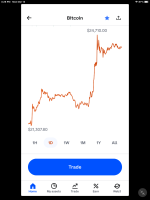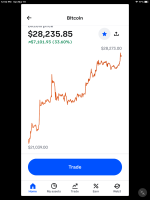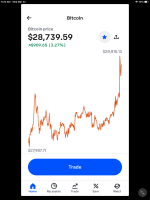Cooper & Kirk
Operation Choke Point 2.0: The Federal Bank Regulators Come For Crypto
...
Executive Summary
Recent stories in the financial press have uncovered a coordinated campaign by prudential bank regulators to drive crypto businesses out of the financial system. Bank regulators have published informal guidance documents that single out cryptocurrency and cryptocurrency customers as a risk to the banking system. Businesses in the cryptocurrency marketplace are losing their bank accounts, or their access to the ACH network, suddenly, and with no explanation from their bankers. The owners and employees of cryptocurrency firms are even having their personal accounts closed without explanation. And over the past two weeks, federal regulators have shut down a solvent bank that was known to be serving the crypto industry and, although it is required to resolve banks through the “least cost resolution” to the Deposit Insurance Fund, the FDIC chose to shutter rather than sell the part of the bank that serves digital asset customers, costing the Fund billions of dollars.
This pattern of events is not random, and we have seen it before. This is not the first time that federal bank regulators, working with their State-level counterparts, have abused their supervisory authority to label businesses unworthy of having a bank account and worked in secret to purge disfavored lines of commerce from the financial system. Beginning in 2012, the Federal Deposit Insurance Corporation, the Office of the Comptroller of the Currency, and the Board of Governors of the Federal Reserve System carried out a coordinated campaign to weaponize the banks against industries that had fallen out of favor with the administration—including gun stores, pawn shops, tobacco stores, payday lenders, and a host of other brick and mortar businesses. That campaign was called Operation Choke Point.
Our firm successfully challenged Operation Choke Point, and it was brought to a halt. The current bout of regulatory overreach against the crypto industry is illegal for much the same as reason as its predecessor. Specifically:
• Operation Choke Point 2.0 deprives business of their constitutional rights to due process in violation of the Fifth Amendment. It is well settled that when a federal agency attaches a derogatory label to an individual or business, and this stigmatizing label causes the business to lose a bank account or broadly precludes them from the pursuit of their chosen trade, the agency has violated the Due Process Clause of the Fifth Amendment, unless if first afforded the individual or business a right to be heard. This is precisely what the federal bank regulators responsible for Operation Choke Point 2.0 have done and continue to do by labeling crypto businesses a threat to the financial system, a source of fraud and misinformation, and a risk to bank liquidity.
• Operation Choke Point 2.0 violates both the non-delegation doctrine and the anticommandeering doctrine, depriving Americans of key structural constitutional protections against the arbitrary exercise of governmental power.
• By leveraging their authority over the banks to acquire the power to pick and choose the customers whom the banks may serve, the bank regulators have exceeded their statutory authority. The bank regulators are charged with supervising the safety and soundness of the banks; their effort to anoint themselves the gatekeepers of the financial system and the ultimate arbiters of American innovation and American economic life cannot be permitted to stand.
• The federal bank regulators are also refusing to perform their non-discretionary duties when doing so will benefit the cryptocurrency industry. State banks that are statutorily entitled to access the federal reserve system are being denied their rights solely because they serve the crypto industry. The federal bank regulators are not free to pick and choose which statutory obligations they duties they wish to perform.
• The federal bank regulators are evading the notice and comment rulemaking requirements of the administrative procedure act by imposing binding requirements on the banking industry through informal guidance documents. This is undemocratic, since it deprives the public of the right to comment on proposed rules, and it also runs contrary to the principle of judicial review, since courts lack the power to review “informal” agency actions.
• Finally, the federal bank regulators are acting in an arbitrary and capricious fashion by failing to adequately explain their decisions, by failing to engage in reasoned decisionmaking, and by failing to treat like cases alike. It is difficult to imagine a more arbitrary and capricious agency action than simultaneously placing a solvent bank into receivership solely because it provided financial services to the crypto industry, while permitting insolvent institutions not tied to the crypto industry to continue operating.
We therefore urge Congress to perform its oversight role and hold these agencies to account. In section IV of this paper, we propose a series of questions that need to be answered— and a series steps that Congress should take in an effort to obtain those answers.
• First, Congress should require the bank regulators to produce their communications with supervised financial institutions and state regulatory agencies regarding the denial or regulation of access to the financial system by crypto businesses and banks that serve the crypto industry.
• Second, Congress should require the federal bank regulatory agencies to explain the basis for their conclusion that the safety and soundness of the financial system require the insulation of the banks from blockchain technology, from customers who operate in the crypto space, and from state-chartered depository institutions that are currently serving those customers.
• Third, Congress should make clear to the federal bank regulators, and all federal agencies, that the notice and comment rulemaking requirements of the Administrative Procedure Act are not optional. The requirements imposed by the APA are not obstacles to be evaded by the use of informal guidance documents.
• Fourth, Congress should investigate the role of federal regulators in the decision by the New York Department of Financial Supervision’s decision to shutter Signature Bank. Congress should also determine the FDIC’s role in excluding bidders who wished to acquire Signature’s digital asset businesses from the bidding process.
• Fifth, Congress should investigate whether bank regulators are acting to squelch private sector innovation in order to clear the field of competition for the benefit of existing federally regulated banks or for a federal cryptocurrency alternative. The persistent unwillingness of the nation’s bank regulators to follow the law and obey the Constitution calls out for Congressional action. Cracks are starting to form in the American financial system as its regulators increasingly abuse their power to achieve aims outside their authority and beyond their competence.
...


















